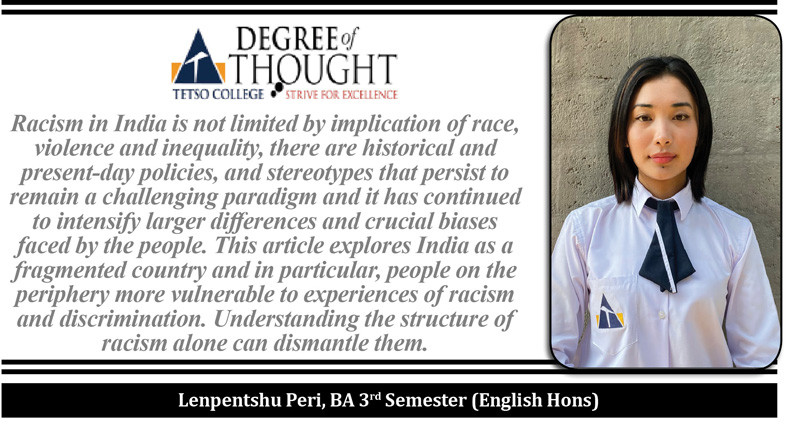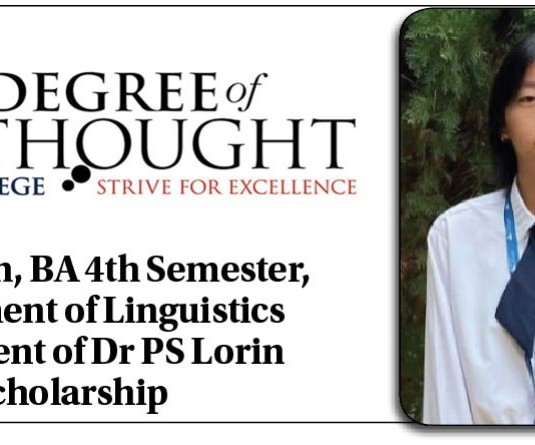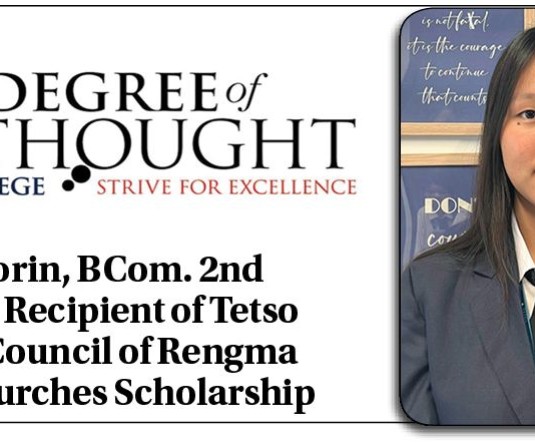
As of the 2011 Census, the population of India stands firm at approximately 125.03 (1.25 billion), and projected to be around 139.27 crore (1.39 billion) in the year 2021. India’s cultural diversity is even more manifold than the rest of the neighbouring countries, or so to say. With every state having its own unique identity in languages, religions, customs, traditions, etc, India is a so much a celebration, we all observe and celebrate together. Hinduism being the religious majority with 79.8% of the total population and with the least of 0.37% belonging to Jainism while Christianity comprises 2.3%. India as a country is very pragmatic, rather sensible to the so-called term “racism.” Every responsible citizen must take serious note and reconsider the problems of racism. It is racial discrimination, intolerance, apartheid, antagonism and prejudice by individuals, communities or institutions against a certain people or certain group of people on the basis of their racial or ethnic group. It is a big shame for India, as the Father of the Nation, Mahatma Gandhi himself faced racial discrimination in South Africa and it was he who envisioned that India must not be under the imperial power of the British and that India must reunite as one irrespective of any circumstances to make India independent and free to practice democracy and freedom from colonizers.
Despite this, racial discrimination is prevalent in all aspects of Indian society and more so even in our Naga society. Agree or disagree, the caste system existing in Indian society is one such reality which is demeaning and offensive. Whether discrimination is based on the appearance and social status of a person? If so, didn’t we forget that racism erupts right from the heart of our social and religious practices? It is disheartening to see in daily newspapers and various social media particularly mentioning the origin or caste of a person as “Dalit” or “Brahmin” when an issue arises that needs social identification and wasn’t supposed to be reciprocated between the two castes. More so even in Nagaland, the issue of the quota system, the so called backward tribes privileges, for them it is a way forward for social, political and economic upliftment but majority other than those suppressed may take it as self-proclamation of one’s own inferiority which is a serious issue of mismanagement among its own community.
Racist remarks and its social evils are prevalent amongst all communities, one cannot really identify the origin of the cause, but most researchers ascertain that humans have evolved in competition to fit the Darwinian-theory on survival of the fittest. It is when the humans have differentiated the exclusive biological differences to segregate and unite with or against its opponents and successors. Scientists and anthropologists agree with this prospect of competition as a favoured fight to preserve a particular race and identity, which by scientific terminology is Natural Selection. Would one consider evolution as the cause of racism then? The ultimate response is rather obnoxious due to its existence despite modern constitutional remedies. It is daunting that untouchability is still prevalent. It is not uncommon or rare that racism and its prejudice exist only within our country or in a particular community. It is a global process, a phenomenon that needs more attention from global organizations which recognize the values and virtues of every entity beyond races. Typecasting on various grounds are promulgated due to social interactions and attributions, they are conspicuous in nature and hinder one’s social status and recognition. They are carried forward in the form of a communal history or folklore and more so forming a social hierarchy and status within a particular tribe or community.
A common instance of racism being defined clearly or rather a more confused term among the Nagas particularly to those who pursue their career. A pluralistic, multi-ethnic and racial co-existence is a necessity if a vibrant and progressive nation and community has to be set up. Apartheid is not the solution when India is termed strongly as a nation with unity in diversity. Racism must not become a part of our intellectual consciousness and one must be abhorrent to it. The egalitarian principle must be inculcated, wherein every system of practice, belief, identity, origin, opportunities and similar fundamentals must equally be envisioned and imparted. India had always been an open bowel ready to imbibe and transpire. It has always been generous enough in guiding and influencing world views in various aspects. Racism should be a deep concern in an opportunistic world as it divides the very roots of any society and weakens the institutional structure. One must remember that it was during the era of the British that they created the “Divide and Rule” policy just to split and dissect Indians in every ground leaving no stones unturned. Now, it is our duty not to recreate the vandalism of racism but to unleash the democratic power and bring changes to the traditional system of belief and overview about our neighbours and create conditions towards social, economic and political welfare.
In reference to measures against racism, it is necessary to promote a more institutionalized inter-cultural exchange and interactions. There is also an ardent need for reforms and spreading social awareness which must be made conscious through protection under the Scheduled Caste and Scheduled Tribes (Prevention of Atrocities) Act. The constitution guarantees basic fundamental rights to citizen that prohibits discrimination on grounds of religion, race, caste, sex or place of birth vide Article 15 and protection of certain rights including the right to move freely throughout the territory of India and to reside and settle in any part of the territory of India vide Article 19. As discussed, India is still to construct itself as a cohesive nation-state.
Degree of Thought is a weekly community column initiated by Tetso College in partnership with The Morung Express. Degree of Thought will delve into the social, cultural, political and educational issues around us. The views expressed here do not reflect the opinion of the institution. Tetso College is a NAAC Accredited UGC recognised Commerce and Arts College. The editors are Dr Hewasa Lorin, Dr Aniruddha Babar, Aienla A, Meren and Kvulo Lorin. For feedback or comments please email: dot@tetsocollege.org






